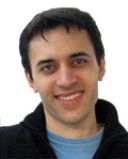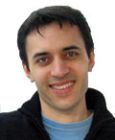Infidelity
David Servan-Schreiber on Cheating Death
Neuroscientist David Servan-Schreieber on how he beat brain cancer.
Posted April 3, 2009
David Servan-Schrieber was 31 when his world imploded. Ambitious and arrogant, with French blueblood coursing through his veins, he was a founding member of Doctors Without Borders and a rising star in neuropsychiatry. But when a volunteer for a brain scan experiment didn’t show up, he slid into the scanner himself—and discovered a malignant tumor nestled deep in his brain. After surgery and chemotherapy, he asked his oncologist what he should change. “Nothing,” replied the oncologist. So Servan-Schrieber continued living his life as he had before, eating a diet high in sugar and red meat, exercising little, and abandoning an earlier interest in meditation. When the tumor returned a few years later, he used his medical training to investigate how best to prevent cancer. The result was remission—and a bestselling book called Anticancer: A New Way of Life. For the current issue of Psychology Today, I reached him in Paris. —Jay Dixit

How did you feel when you first saw the tumor in your brain on the scan?
That this was not in the plans at all. All I had done was invest in the future. I’d spent my life preparing for a future that would not exist. My mind just stopped.
Then what happened?
Something quite miraculous which sometimes happens in extreme situations. I had this internal dialogue: “This can’t be true. It’s unfair. It can’t be happening to me.” Then a voice said, “It’s going to be OK. This is going to happen to every human being at one point or another.” It was a voice so absolutely sure. You don’t argue with that. I realized this capacity to connect to something larger than yourself is an extraordinarily important aspect of the psyche. In retrospect I feel I was quite incomplete before.
Why did you get cancer?
Exposure to chemicals, pesticides, electromagnetic fields, years in front of a computer screen, what I ate, my inability to deal with stress. There were a lot of things I could have done differently.
If I were trying to get cancer, what would I do?
Expose yourself to chemicals, car exhaust, diesel fumes, plastics, the chemicals of household products. Smoke. Drink. Don’t exercise. Eat McDonald's, eat fast food, make sure you don’t eat vegetables because they take too long to cook and they rot in the fridge. Manage your stress with alcohol and cigarettes, and don’t pay much attention to your personal life.
If I want to avoid cancer, what should I do?
Pay attention to what you eat. The food you eat every day three times a day plays on your biology like a pianist’s fingers on a keyboard.
It doesn’t have a major effect on health, of course. You can could eat ice cream every day and nothing happens. You can eat pizza every day for a week and nothing happens. You can eat McDonald's every day three times a day for a month and nothing happens. But the things you do every day three times a day start to have a very profound effect on your biology over the mid- to long-term. You notice things after a few months. Definitely after a few years, and you can’t escape them after 10 or 30 years. So pay attention to what you eat. Reduce white sugar, white flour, and omega 6 fatty acids, which includes red meat and a number of dairy products.
Then add a number of anticancer foods, which are mostly vegetables and fruits. But that’s not enough, to just eat fruits and vegetables. There are some that are much stronger anticancer foods then others, so include some of that and try to include them every day three times a day. That makes an enormous difference in your biology’s ability to resist disease.
Physical activity, which doesn’t necessarily even mean exercise. Women who walk 30 minutes six times a week reduce by half their chance of relapse after breast cancer. So walking to work or biking to work, which I’ve done for years now, makes an enormous difference.
Then learning how to manage stress differently. Don’t manage stress with cigarettes and alcohol. Learn how to manage stress in relationships at work, learn how to control your breathing and your concentration.
And then learn how to avoid environmental contaminants that can help promote cancer. It’s OK to do dry cleaning, but make sure you air your garments for a couple hours before wearing them. For years I would put the plastic bag straight into the closet. Which meant they’d keep the highest possible concentration of chemicals that I would inhale if I wore them. So avoid that and cosmetics and creams. We need to avoid some of the exposure to cleaning products that can be toxic. Try to use as much as possible white vinegar, baking soda, or ecologically safe cleaning products.
What insight did your experience give you about the ability of people to manage their own health?
Most of my physician colleagues believe adamantly that most people do not want to change. Certainly when I was given the information about things I could do that would slow down cancer growth, I was quite willing to change. It’s hard for me to imagine I’m the only one in that situation.
What made you question the advice you got from your oncologist about preventing relapse?
As a physician I had had that same attitude. Nobody invites us physicians for a week for free to give us a course on the benefits of yoga, jogging, broccoli, and garlic.
In the conventional model, we turn over our health care to doctors.
I hope it will change. As it stands now, they do very little to help your body do its part to fight the disease. They do not support the terrain, they only target the tumor. We also need to know we can go further.
What did you do in your case that mattered most for your health after you got cancer?
I got surgery and chemotherapy and radiotherapy, and that saved my life. There is no alternative to conventional treatment for cancer. Still, I do very firmly believe it would not have been enough. I know a lot of people who had the same tumor I had who are dead today. I think the things I did on the side played an extraordinarily important role.
There’s a feeling among some people that getting cancer was the best thing that ever happened to them.
Part of me still wishes I never had cancer. But a big part of me feels like it was a second birth. I was born to a new being completely. Which is more grateful, more appreciative, friendlier, more energetic, more enthusiastic about life, more aware, happier.
Did being a doctor give you an advantage in navigating the system or at least questioning the advice you got?
Huge. I knew how much my colleagues did not know. When they said it doesn’t matter what you eat, I knew they did not know that. I had given this stock answer to people myself not knowing what I was saying. I was able to count through the scientific literature with perspective. It’s hard to know which ones are promising and which ones are dead ends. I had a trained eye.
Does despair undermine the body's ability to cope?
They say, “Don’t cry, you’re making the cancer grow!” That’s not what happens. It’s the chronic sense of desperation—feeling stuck and powerless—that’s dangerous. In fact a good cry is a way to get beyond that chronic sense of despair, especially when it’s being heard by a mate or friend or intimate partner. This kind of intimacy is a strong protective factor.
How should we manage stress?
The first line of defense against stress is physical exercise. Jogging three times a week has the same effectiveness as an antidepressant, but much more lasting benefits. Plus yoga, qigong, and meditation—the so-called relaxation response. It’s so easy and so simple based purely on concentration of attention and breathing. But it is not taught in medical school and it’s not part of our health system in spite of the well-documented and powerful effects.
Are you suggesting that our default state is to develop cancer?
Yes. One hundred percent of people over 50 have cancer cells in their body. That the majority of people don’t develop cancer proves we have defenses in the cells of it ever becoming an illness.
Is American culture disproportionately exposing Americans to cancer?
Every single place where American diet has spread has seen massive increases in obesity rates and cancer rates. Japan is increasing consumption of red meat and dairy products and seeing an enormous increase in obesity and great increases in prostate cancer and breast cancer, which were extremely rare before.
Who would you be today if he hadn't gotten cancer?
I don’t want to misjudge the young man I was. Maybe he would have wised up anyway.
For the full version of this interview, click here.




